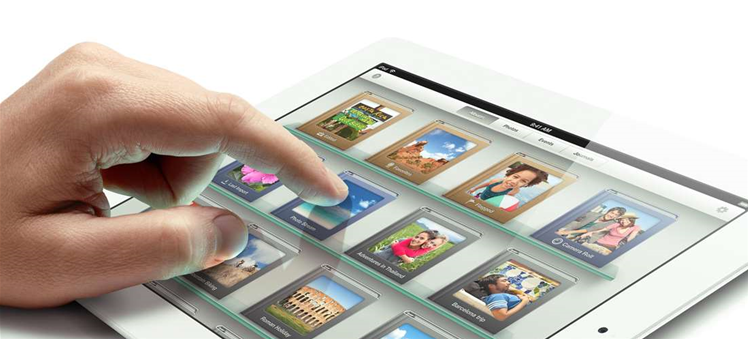Apple took the wraps off a faster, higher resolution iPad this morning starting at $539 overnight, in a bid to safeguard the tablet’s dominance over rivals from Amazon and Samsung.

The third-generation tablet is available for pre-order from today and will launch in Australia on March 16.
But users of the new iPad will likely have to suffice with 3G technology in Australia, rather than the LTE speeds Apple has touted on US carriers AT&T and Verizon.
3G v 4G
Though packing 4G mobile technology, Apple’s new iPad will only be compatible with LTE networks working over the 700 MHz and 2100 MHz spectrum ranges, both of which are currently not planned for local networks.
Australia’s only current 4G network, part of Telstra's Next G coverage in capital and regional centres, uses the 1800 MHz frequency range while Vodafone and Optus have both slated the same frequency for their respective LTE networks, due to be launched later this year.
Optus is also expected to launch a new TD-LTE network based on the 2.3 GHz frequency range off the back of its $230 million vividwireless acquisition earlier this month, but this is unlikely to be compatible with the updated iPad either.
A Telstra spokesman redirected all media queries to Apple, which did not return questions at time of writing.
However, the new iPad does introduce dual-carrier HSDPA technology, allowing for speeds of 21 Mbps or 42 Mbps on compatible local networks, which currently include Telstra Next G and Optus’ 3G network in some areas.
The iPad will range in price from $539 to $899 for a variety of models offering wi-fi-only or wi-fi and 3G/LTE capability with storage capacities of 16GB, 32GB and 64GB.
Alongside the new LTE technology, Apple has touted the new iPad’s ‘Retina’ display, offering an upgraded resolution of 2048x1536 pixels, as well as an upgraded dual-core processor and five-megapixel camera with 1080p video recording.
Market expectations
Apple Chief executive Tim Cook, presiding over his second major product launch after debuting with 2011's voice-enabled iPhone 4S, introduced the highly anticipated third iteration of the tablet at an event held in San Francisco overnight.
Shares of Apple closed barely higher, up 43 cents at $US530.69.
Some had held out hope of a positive Apple surprise, recalling late CEO Steve Jobs and his now-iconic "one more thing" unveils at the very end of the such announcements. Others said the upgrades and tweaks to the iPad could only go so far in fending off hard-charging competition.
"While the hardware is notably enhanced, with an impressive retina display, better camera and faster processor, there are still some areas of improvement that Apple needs to work on, in order to stay ahead of its encroaching competitors," said Fred Huet, managing partner at Greenwich Consulting.
"As tablets are increasingly being used for personal media consumption, it is promising to see a better screen resolution. But will this be enough to ensure Apple's competitive lead in the marketplace? No."
Until now, buyers have been reluctant to shell out extra cash even for iPads with slower 3G connections. The cheaper wi-fi-only model, with much more limited Web access, is by far Apple's top-selling one today.
"The iPhone 4S showed us that Apple doesn't need to out-do itself with new product designs to continue extending its domination of a category," said CCS Insight analyst John Jackson.
Post-PC world
Cook again held forth on what he called a "post-PC world," in which users move increasingly away from traditional desktop and laptop computing and toward an array of portable devices, including tablets.
Smartphones and tablets are starting to eat into PC sales as mobile technology gets more advanced and available content expands.
Some experts believe mobile devices, as they get more powerful, will eventually displace PCs in many markets, hurting business for the likes of HP and Dell.
The global tablet user base reached 67 million in 2011, according to researcher Strategy Analytics. Analysts expect double-digit growth in tablet sales in coming years.
Cook also announced that the company's new $99 Apple TV set-top box, a concept that late CEO Steve Jobs had called a "hobby," now supports high-definition 1080p screen technology.
"Last year alone we sold 172 million post-PC devices," Cook told the audience at the Yerba Buena Center in downtown San Francisco, Apple's preferred venue for product unveilings.
"And this made up 76 percent of our revenues. This is incredible."
(Additional reporting by James Hutchinson, Noel Randewich in San Francisco, Nicola Leske and Sinead Carew in New York, and Bill Rigby in Seattle, Writing by Edwin Chan; Editing by Gerald E. McCormick and Tim Dobbyn).


_(33).jpg&h=140&w=231&c=1&s=0)








 iTnews Executive Retreat - Security Leaders Edition
iTnews Executive Retreat - Security Leaders Edition
 iTnews Benchmark Awards 2026
iTnews Benchmark Awards 2026
 iTnews Cloud Covered Breakfast Summit
iTnews Cloud Covered Breakfast Summit
 The 2026 iAwards
The 2026 iAwards












_(1).jpg&h=140&w=231&c=1&s=0)



